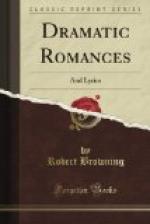If that would compass her desire
And make her one whom they invite
To the famous ball to-morrow night.
There may be heaven; there must be hell;
Meantime, there is our earth here—well!
Notes: “Time’s Revenges.” An author soliloquizes in his garret over the fact that he possesses a friend who loves him and would do anything in his power to serve him, but for whom he cares almost nothing. At the same time he himself loves a woman to such distraction that he counts himself crowned with love’s best crown while sacrificing his soul, his body, his peace, and his fame in brooding on his love, while she could calmly decree that he should roast at a slow fire if it would compass her frivolously ambitious designs. Thus his indifference to his friend is avenged by the indifference the lady shows toward him.
46. The Florentine: Dante. Used here, seemingly, as a symbol of the highest attainments in poesy, his (the speaker’s) reverence for which is so great that he would rather put his cheek under his lady’s foot than that poetry should suffer any indignity at his hands; yet in spite of all the possibilities open to him through his enthusiasm for poetry, he prefers wasting his entire energies upon one unworthy of him.
THE ITALIAN IN ENGLAND
That second time they hunted me
>From hill to plain, from shore to sea,
And Austria, hounding far and wide
Her blood-hounds thro’ the country-side,
Breathed hot and instant on my trace,—
I made six days a hiding-place
Of that dry green old aqueduct
Where I and Charles, when boys, have plucked
The fire-flies from the roof above,
Bright creeping thro’ the moss they love:
10
—How long it seems since Charles was lost!
Six days the soldiers crossed and crossed
The country in my very sight;
And when that peril ceased at night,
The sky broke out in red dismay
With signal fires; well, there I lay
Close covered o’er in my recess,
Up to the neck in ferns and cress,
Thinking on Metternich our friend,
And Charles’s miserable end,
20
And much beside, two days; the third,
Hunger overcame me when I heard
The peasants from the village go
To work among the maize; you know,
With us in Lombardy, they bring
Provisions packed on mules, a string
With little bells that cheer their task,
And casks, and boughs on every cask
To keep the sun’s heat from the wine;
These I let pass in jingling line,
30
And, close on them, dear noisy crew,
The peasants from the village, too;
For at the very rear would troop
Their wives and sisters in a group
To help, I knew. When these had passed,
I threw my glove to strike the last,
Taking the chance: she did not start,
Much less cry out, but stooped apart,




